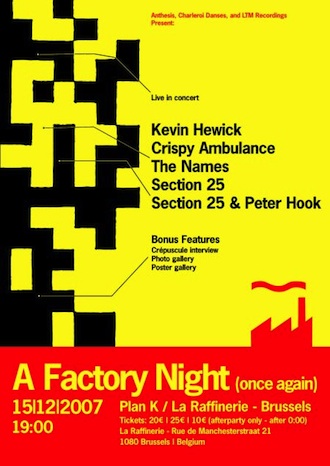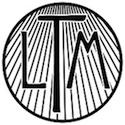A Factory Night (Once Again) [LTMDVD 2519]
A DVD souvenir of A Factory Night (Once Again), the live event staged at the historic Plan K venue in Brussels on 15 December 2007, with performances by Section 25, Crispy Ambulance, The Names, Kevin Hewick and Peter Hook.
The show marked the return of several original Factory artists to the Plan K after a break of more than 25 years. Shot in HD with five cameras and a digital stereo soundtrack, the live section of the DVD features more than 2 hours of in-concert highlights (28 tracks) from all four bands, as well as the encore of the New Order classic Temptation by Section 25 and Peter Hook.
NTSC format, Region 0. Bonus features include poster and photo galleries, as well as a rare 1981 television interview with Annik Honoré exploring the early history of Factory Benelux and Les Disques du Crépuscule.
DVD tracklist:
Kevin Hewick:
01. The Myth
02. Landscape
03. Ophelia's Drinking Song
04. Run To Where Only a Woman Can Run
05. Haystack
Crispy Ambulance:
06. Quarter Caste
07. Evil Eye
08. Deaf
09. The Presence
10. Chimera
11. Lucifer Rising
12. Travel Time
13. The Plateau Phase
14. Open Gates of Fire
The Names:
15. Calcutta
16. The Astronaut
17. I Wish I Could Speak Your Language
18. Discovery
Section 25:
19. Be Brave
20. Wretch
21. Friendly Fires
22. Poppy Fields
23. Can't Let Go
24. New Horizon
25. After Image
26. Looking From a Hilltop
27. Dirty Disco
Section 25 & Peter Hook:
28. Temptation

AU PLAN K
Until late 1979, Belgian popular culture could boast a limited impact on the wider world. True, in 1963 the Singing Nun topped the US singles chart with Dominique, and fourteen years later Plastic Bertrand scored a worldwide hit with an energetic slice of parody punk, Ca Plane Pour Moi. But both were essentially novelty records, and the troubled career of Sister Luc Gabriel would ultimately end in tax wrangles and a suicide pact. Cartoon boy hero Tin Tin and troubadour Jacques Brel enjoyed worldwide renown, but most outsiders imagined they were French, while the saxophone (invented by Walloon-born Adolphe Saxe in 1840) occupied but limited space in the post-punk landscape. Only in April 1980 would the Belgian avant-garde reach a mass audience, when electro-pop trio Telex represented the nation in the Eurovision Song Contest, turning in a wry performance awarded just fourteen post-modern points.
As ever, appearances deceive. Standing at the crossroads of Europe, Brussels boasted an alternative scene no less tuned-in as Paris or Amsterdam, and probably more so. New wave luminaries such as Patti Smith, Talking Heads, XTC and Magazine had enjoyed early success in the city, even if a performance by electro-rockers Suicide in June 1978 provoked the disturbance preserved on the 23 Minutes Over Brussels bootleg flexi. Public Image Limited also made their live debut in the city, at Theatre 140 in December 1978. Artists such as these inspired home-grown talent including Digital Dance, The Names, Siglo XX and Polyphonic Size, while Virgin-signed Telex were far more credible than Eurovision infamy suggested. A handful of new independent labels were also poised to emerge, including Sandwich, Double Dose, Crammed and Les Disques du Crépuscule. Those too impatient to wait for local new wave records could purchase hip imports from Caroline and Casablanca Moon, while live venues included the Ancienne Belgique, Beursschouwburg, and an important new multi-media arts space, Plan K.
Situated on the Rue de Manchester in the Molenbeek district, Plan K was a labyrinthine former refinery built in the 1850s, six storeys high and adding up to 4,300 square metres. Employing 2,000 workers at its pre-war peak, the Graffe raffinerie was all about sugar: brown on the ground floor and white on the fourth, with sugar loaves a speciality. Later the building was occupied by an American firm and used for colour dyes. Disused by 1979, the industrial landmark was leased and renovated by choreographer Frédéric Flamand and his avant-garde dance troupe (called Plan K), seduced by the cloistered, industrial, pre-Haçienda architecture and the potential of 22 large rooms as a multi-media performance space. With the object of mixing diverse audiences and promoting new synergies, Flamand sought to combine dance, theatre, music and audiovisual art, so that the Plan K complex - like Brussels itself - would become an international cultural crossroads. More accurately, counter-cultural, and entirely free of the strictures imposed by the international avant-garde mafia. And for several years Plan K succeeded famously, the place to be and the place to see.
Many early musical bookings at Plan K were arranged by urbane journalist/economist Michel Duval together with Annik Honoré, then working as a bilingual secretary at the Belgian Embassy in London. Annik's relationship with Joy Division lead to the rising Factory band being booked to appear at the formal Plan K opening on 16 October 1979. This more than lived up to Flamand's multi-media ambition, and offered music, dance, film and readings across several consecutive nights. The focal point was celebrated addict and avant-garde writer William S. Burroughs, author of Junkie, Naked Lunch and The Soft Machine, as well as The Third Mind, a collaboration with fellow cut-up pioneer Brion Gysin. Gysin also appeared on the bill, as did Cathy Acker, along with sundry other readings and lectures. Films included the infamous 1970 Mick Jagger vehicle Performance and two Burroughs shorts by Anthony Balch, while the Plan K dance troupe performed a piece called 23 Skidoo. Although the 'rock concert' featuring Joy Division and Cabaret Voltaire was billed second from bottom on the Marc Borgers-designed poster, healthy import sales of Unknown Pleasures and the Cabs' several singles on Rough Trade ensured a healthy audience of two or three hundred in the ground floor concert hall.
Plan K was soon established as a significant cultural landmark on the European circuit. Indeed within six months of opening, the venue had hosted further mixed-media concerts featuring Echo and the Bunnymen, Teardrop Explodes, Spizz Energi, Delta 5, The Slits, The Pop Group, James White/Chance, The Human League and Winston Tong. Plan K also booked a return visit by Joy Division on 17 January 1980, supported by local post-punk contenders Digital Dance. Factory's connections with Brussels were further enhanced on 26 April, when A Certain Ratio, Section 25 and Eric Random (aka A Boy Alone) played at the venue, this time accompanied by Tony Wilson. It was at this event that The Names formally arranged to record a single for Factory.
Wilson, Honoré and Duval also agreed to set up a new sister label, Factory Benelux, which in turn paved the way for Les Disques du Crépuscule. Section 25, ACR and The Names performed together at the ULB on 31 October 1980, and SXXV would return to Brussels yet again on 14 January 1982, performing with Crispy Ambulance at the Art & Buffet, a venue in Anderlecht. By then, however, the Cold Wave was beginning to thaw, and by 1986 Plan K had ceased hosting concerts at all. Thankfully something of the magic of these events is preserved by the photography of Philippe Carly and Marc Portee, and some magnificent poster designs by Benoît Hennebert, Claude Stassart, Marc Borgers, Charles Van Hoorick, Joelle van Audenaeghe, Jean-François Octave and others.
Two decades pass, in which Fact(ory) becomes legend. Thanks to dedicated Brussels promoter Frederic Cotton and Anthesis asbl/Le Fantastique, a quartet of first-wave Factory artists returned to Plan K on 15 December 2007, when Kevin Hewick, Crispy Ambulance, The Names and Section 25 took part in A Factory Night (Once Again). The four live bands were complemented by deejays Peter Hook (Joy Division/New Order) and Martin Moscrop (ACR), as well as photographic exhibitions by Philippe Carly, Marc Portee and Katja Ruge, a display of archive Plan K posters, and a showing of the Factory documentary film Shadowplayers. With Plan K closed to 'rock' gigs for more than twenty years, this remarkable event ensured a sell-out crowd of 1400 people, and was also attended by several Factory / Benelux / Crépuscule luminaries including Michel Duval, Annik Honoré and Mark Reeder. Factory founder Anthony H. Wilson having lost his battle with cancer on 10 August, this remarkable Plan K reunion also served as a tribute to a remarkable man.
James Nice


![Shadowplayers documentary [LTMDVD 2391]](../images/ltmdvd2391_1_330_sq.jpg)
![UMBRELLAS IN THE SUN [LTMDVD 2400]](../images/ltmdvd2400_330_sq.jpg)
![The Wake - Live at the Haçienda [LTMDVD 2422]](../images/ltmdvd2422_330.jpg)
![Section 25 - So Far [LTMDVD 2429]](../images/ltmdvd2429_330_sq.jpg)
![Isabelle Antena - Transmissions [LTMDVD 2494]](../images/ltmdvd2494_sq.jpg)
![Section 25 - Communicants [LTMDVD 2496]](../images/ltmdvd2496_330_sq.jpg)
![A Factory Night (Once Again) [LTMDVD 2519]](../images/ltmdvd2519_330_sq.jpg)
![The Names - Nightshift: Live at Plan K [LTMDVD 2522]](../images/ltmdvd2522_330_sq.jpg)